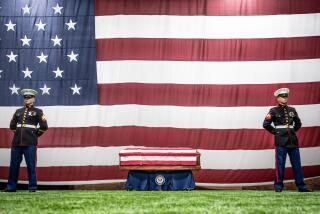The enemy of hope
- Share via
U.S. GENERALS HAVE WARNED for months that insurgents in Iraq are increasing the sophistication of their tactics to match countermeasures by U.S. forces. Wednesday’s roadside bombing that killed 14 Marines demonstrates the truth of that message -- and the ever more deadly danger to American troops.
With the U.S. death toll now past 1,800, the need for a constitution that knits together Iraq’s three disparate groups is ever more evident. The interim assembly is writing the country’s basic law and is supposed to publish it a week from Monday. Kurds, Sunni Arabs and Shiites are arguing over fundamental issues, including the role of Islamic law and the rights of women.
A constitution will be a step forward. But it would be a mistake to infuse Aug. 15 with too much significance. There have been other supposedly transformative events -- the capture of Saddam Hussein in December 2003, the transfer of sovereignty from U.S. occupiers to Iraqis in June 2004, the Iraqi parliamentary elections last January -- that have failed to end the violence in Iraq.
Agreement on important issues, followed by approval of the constitution and new elections for a national assembly by year’s end, could well give Iraqis a sense that they are represented by lawmakers in a way that was impossible under Hussein. And that could weaken support for the militants who kill not just U.S. troops but Iraqi civilians as well.
Against this hope, however, lies the horrific reality of this week. The servicemen killed Wednesday were from the same Ohio Reserve unit that lost five Marines in Iraq on Monday. Their deaths brought to Brook Park the sorrow so often felt in military towns, such as Camp Pendleton, that are home to regular forces.
The 14 Marines killed were riding in a troop carrier in western Iraq, an entry route for fighters from Syria.
A huge roadside bomb flipped the 25-ton vehicle over and sent it into flames. Military spokesman Brig. Gen. Carter Ham said recent months brought a decrease in the number of attacks from improvised explosive devices but an increase in the power and lethality of the explosives planted in the path of U.S. vehicles. New weapons have been modified to concentrate the area of an explosion and increase the likelihood that it can penetrate armored vehicles.
The U.N. Security Council on Thursday condemned the violence in Iraq and urged other nations to prevent the movement of fighters, weapons and terrorist financing into the country. That would be a help in fighting insurgents.
Longer term, Iraq needs more trained police and soldiers to help U.S. forces and eventually replace them, and an elected, representative government that can make Iraqis safe in their homes and on the streets -- and satisfy neighboring countries that the threat of an invasion from Baghdad is part of the past.
More to Read
Sign up for Essential California
The most important California stories and recommendations in your inbox every morning.
You may occasionally receive promotional content from the Los Angeles Times.













